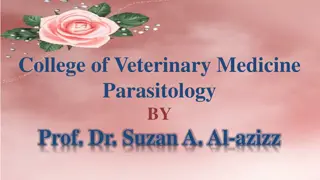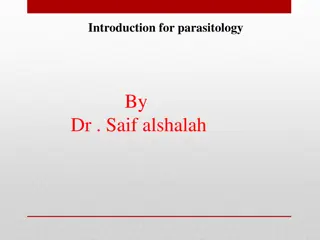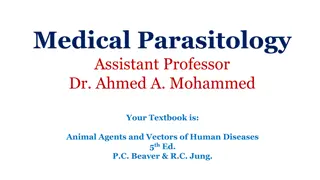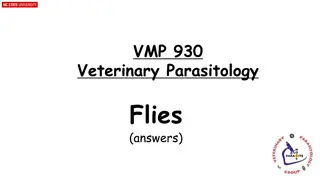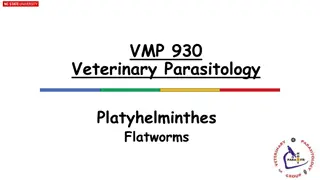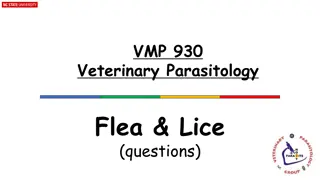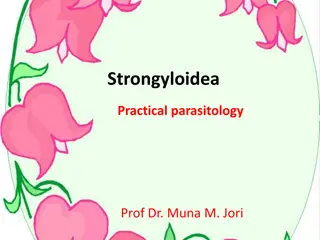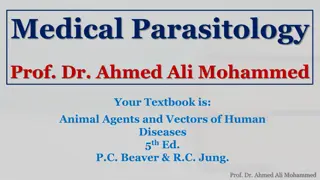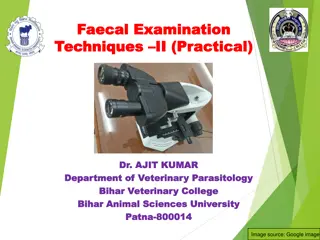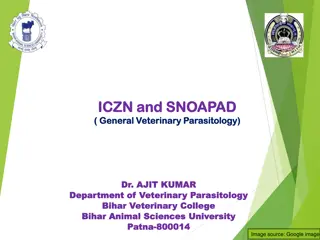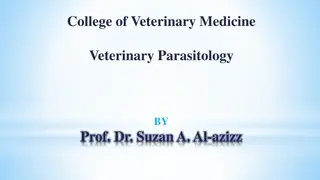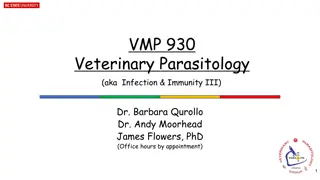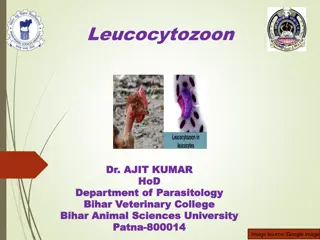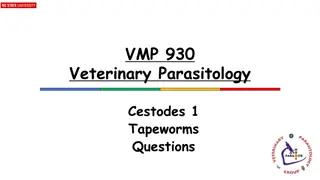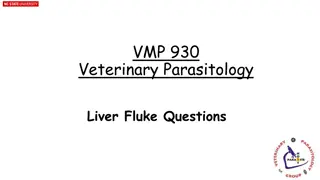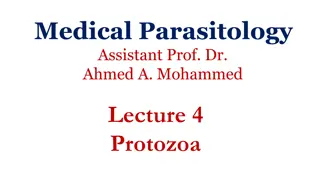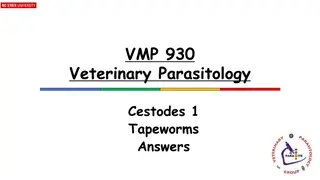Understanding Parasitology: A Comprehensive Overview
Parasitology is the study of parasites, their hosts, and the interactions between them. This field explores the different aspects of parasitism, including the relationships between parasites and hosts, the classification of major parasite groups like protozoa, helminths, and arthropods, and terms crucial to understanding parasitology such as parasite, host, and zoonosis. Dive into the world of parasitology to learn about the taxonomic classification of protozoa and helminths, and gain insights into the intricate relationships that exist in this fascinating field.
Download Presentation

Please find below an Image/Link to download the presentation.
The content on the website is provided AS IS for your information and personal use only. It may not be sold, licensed, or shared on other websites without obtaining consent from the author. Download presentation by click this link. If you encounter any issues during the download, it is possible that the publisher has removed the file from their server.
E N D
Presentation Transcript
212 212 Zoo Zoo Demonstrator: Moudy Bin Saleh Revised by : Dr. Sawsan Omar
What is a Parasitology? Parasitology is the study of parasites, their hosts, and the relationship between them.
What is Parasitism? 1. It is a form of relationship between two species which one benefits at the expense of the other in metabolic dependency ( developmental stimuli, nutritional dependence ,digestive enzymes , control of maturation) sometimes without killing it.
Terms of Parasitology Parasite: It is the benefited partner. It is an animal organism which lives in or on the host in order to obtain nourishment and shelter from the host.
Terms of Parasitology Host: In parasitism, it supplies the parasite with nourishment and shelter .
Terms of Parasitology Zoonosis : refers to animal s diseases which can be transmitted to man. (These animals infected with parasites are called reservoir hosts).
Major Parasite Groups 1 Protozoa Sarcomastigophora Apicomplexa Ciliophora 2 Helminths Flat Worms Round Worms 3 Arthropods Insects Ticks & mites
Taxonomic classification of protozoa Sub Genus- examples Phylum Sub-phylum Species- examples Kingdom Sarcodina- move by pseudopodia E. histolytica Entamoeba Sarcomastigo -phora further divided into Protozoa Mastigo- phora move by flagella G. lamblia Giardia P.falciparum, P. vivax, P. malariae, P. ovale Apicomplexa no organelle of locomotion Plasmodium Ciliophora move by cillia Balantidium B. coli Enterocyto- zoa Microspora Spore-forming E. bienusi
Taxonomic classification of helminths Sub Species- examples Phylum Class Kingdom - Ascaris (roundworm) - Trichuris (whipworm) - Ancylostoma (hookworm) - Necator (hookworm) - Enterobius (pinworm or threadworm) - Strongyloides Nematodes Round worms; appear round in cross section, they have body cavities, a straight alimentary canal and an anus Metazoa Cestodes Adult tapeworms are found in the intestine of their host They have a head (scolex) with sucking organs, a segmented body but no alimentary canal Platyhelminthes Flat worms; dorsoventrally flattened, no body cavity and, if present, the alimentary canal is blind ending -Taenia (tapeworm) Trematodes Non-segmented, usually leaf- shaped, with two suckers but no distinct head . They have an alimentary canal and are usually hermaphrodite. -Fasciola hepatica (liver fluke) -Schistosoma
Types of Parasites Ectoparasite: Parasites that live on the surface of the host. Temporary parasite : An organism accidentally ingested that survives briefly in the intestine or the parasite can lives free of its host during part of its life cycle.. Permanent parasite : Parasite that lives its entire adult life within or on a host. Obligatory parasite : An organism that is entirely dependent upon a host for its survival.
Types of Parasites cont. Facultative parasite : Parasite can exist free living in soil or water or as parasite . Accidental parasite : one that parasitize an organism other than the usual host. Opportunistic parasite : An organism that is not typically a parasite or Parasite inert (without symptoms) but may become parasitic under specific conditions.
Terms of Parasitology Life cycle Life cycle is the process of a parasite s growth, development and reproduction, which proceeds in one or more different hosts depending on the species of parasites. Infective Stage is a stage when a parasite can invade human body and live in it .
Terms of Parasitology Life cycle Definitive (final) host : harbors adult or sexually reproductive stage of a parasite. Reservoir hosts are the vertebrate hosts which harbor the same species of parasite at same stage as a human host. They are an important source of infection in epidemiology. Intermediate host: harbors larval or asexually reproductive stage of a parasite, according to priority they are classified into first intermediate host, second intermediate host, third intermediate host.
Transmission Mechanical Transmission: Arthropods are passive carriers, i.e play a role of the transportation of pathogens, which is not obligatory for the disease transmission, such as flies carry typhoid bacilli, ascarid eggs and amoebic cysts. Biological Transmission: Arthropods are obligatory vectors. Pathogens have to spend a part of their life cycle in the vector arthropods in which they multiply or develop into the infective stage and then invade the human body under the help of the arthropod, such as Anopheles mosquitoes transmit malaria.
Examples of Parasites.. Cryptosporidium parvum oocysts Mature egg of Ascaris Larvae of Ascaris lumbricoides lumbricoides Cysts of Toxoplasma gondii Anopheles Fasciolopsis buski Anopheles P. vivax parasites. ...


